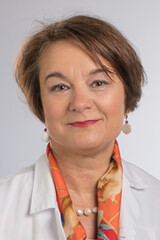Author: Dr Anna Dorothea Wagner, Lausanne University Hospital and University of Lausanne, Switzerland
The importance of sex and gender as modifiers of health and disease is increasingly recognised in literature. Studies reported that there are significant differences in the immune system between the sexes that might affect how immunotherapy works. Also, any given biomarker may not have the same impact in men and women.
At the ESMO Virtual Congress 2020, two studies from China looking at the use of immune checkpoint inhibitors in cancers illustrate just how complex this area is. In a meta-analysis of eight randomised trials, involving over 5,000 patients with non-small-cell lung cancer, both men and women had improved overall survival on immune checkpoint inhibitor treatment compared with chemotherapy (Abstract 1041P). However, unlike men, women derived no progression-free survival benefit. The other study presented the results of a combined pooled patient-level data–meta-analysis on over 6,000 patients, suggesting that the expression levels of tumour PD-L1, at which immune checkpoint inhibitors are effective, differ between men and women and could be used to guide treatment (Abstract 1036P). These results add to our bank of knowledge and confirm previous findings regarding inter-sex differences in biomarker expression. However, for both abstracts the analyses are based on a relatively small number of patients and studies when we consider the enormous number of patients treated with immune checkpoint inhibitors in clinical trials,; therefore we are limited in what we can draw from these data.
The studies provide encouraging evidence that we are making progress in exploring immunotherapy efficacy by sex, albeit slow. For immunotherapy, and for the whole of oncology, we really need a huge collaborative effort involving an integrated network of professionals from a wide range of disciplines if we are to speed up developments in the field. Once we better understand inter-sex differences in tumour biology and host factors, we might be able to develop and ultimately apply different, more specific and efficient treatment strategies and, indeed, consider men and women with non-sex related cancers as biologically distinct populations, as suggested by the consensus of the 2018 ESMO workshop on gender medicine and oncology. Of note, the patients’ sex is only one of different host factors that merit consideration in this context. Since hosting the initial workshop, ESMO has been committed to raising awareness of sex and gender oncology and has witnessed a growing interest in this topic.
Research is also focusing on aspects of cancer other than immunotherapy. Another presentation at ESMO 2020 described trends in lung cancer mortality (Abstract 1788P). This study reported a decreasing gap in mortality between men and women from 2001 to 2017 in the USA and Europe, still with a higher mortality rate persisting in men. While sex differences in the incidence of some subtypes of lung cancer are due to biological differences in cancer susceptibility, the vast majority of lung cancers are related to tobacco use. Thus, the patterns in mortality observed in the study are likely due to gender differences in smoking, which change over time, and need to be distinguished from sex differences in cancer biology.
Sex- and gender-sensitive medicine, or gender medicine, is still very much in its infancy in oncology. This enormously complex but vitally important field requires a profound change in the thinking of healthcare professionals, regulatory agencies and journal editors to help it reach maturity.
I am delighted that ESMO 2020 supported this drive for improved research with its Special Session, ‘What is gender medicine and why do we need it in oncology?’. We wanted the session to raise awareness and provide information about the issue. Perhaps more importantly, we hoped that it would inspire others to become involved in this research. I am absolutely confident that we will reach the stage when sex- and gender-based oncology becomes an integral part of daily clinical practice. How long that will take is going to depend on the enthusiasm and commitment of the oncology community to move this field forward.
Abstracts and sessions details:
- Special Session – What is gender medicine and why do we need it in oncology? 21.09.2020, h.11:15 - 12:15, Channel 2
- Zheng S-Y et al. Explore the efficacy of immune checkpoint inhibitors in non-small cell lung cancer patients of different gender. ESMO Virtual Congress 2020, Abstract 1041P
Poster Display session, h. 17.09.2020 - Yu Y, et al. Patients’ sex and PD-L1 expression jointly associated with overall survival benefits of immune checkpoint inhibitors in cancer. ESMO Virtual Congress 2020, Abstract 1036P
Poster Display session, h. 17.09.2020 - Jani CT et al. Persistent sex-difference in lung cancer mortality between 2001 and 2017 in the US and EU. ESMO Virtual Congress 2020, Abstract 1788P
Poster Display session, h. 17.09.2020






